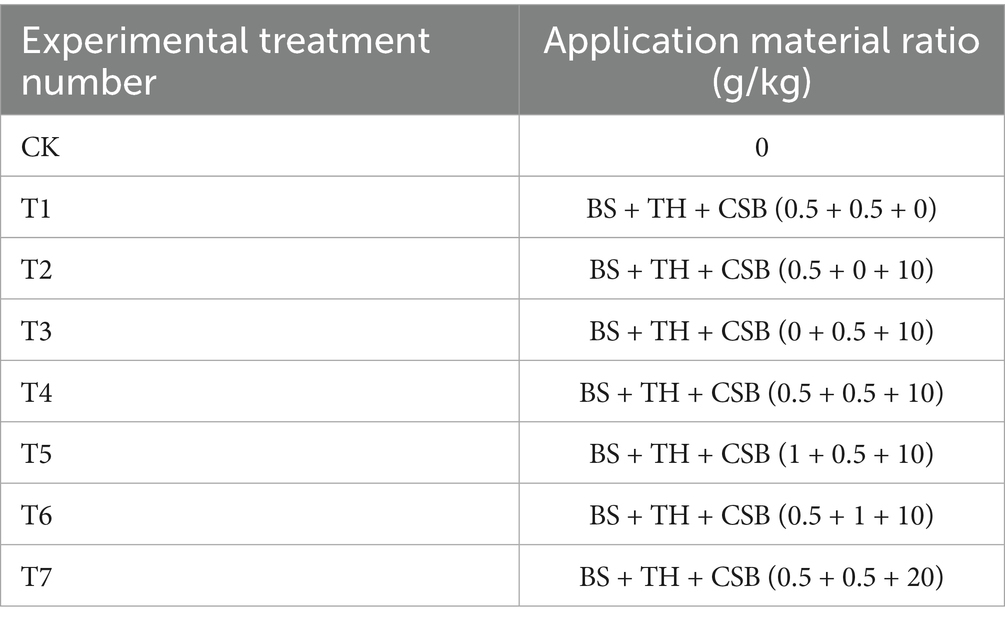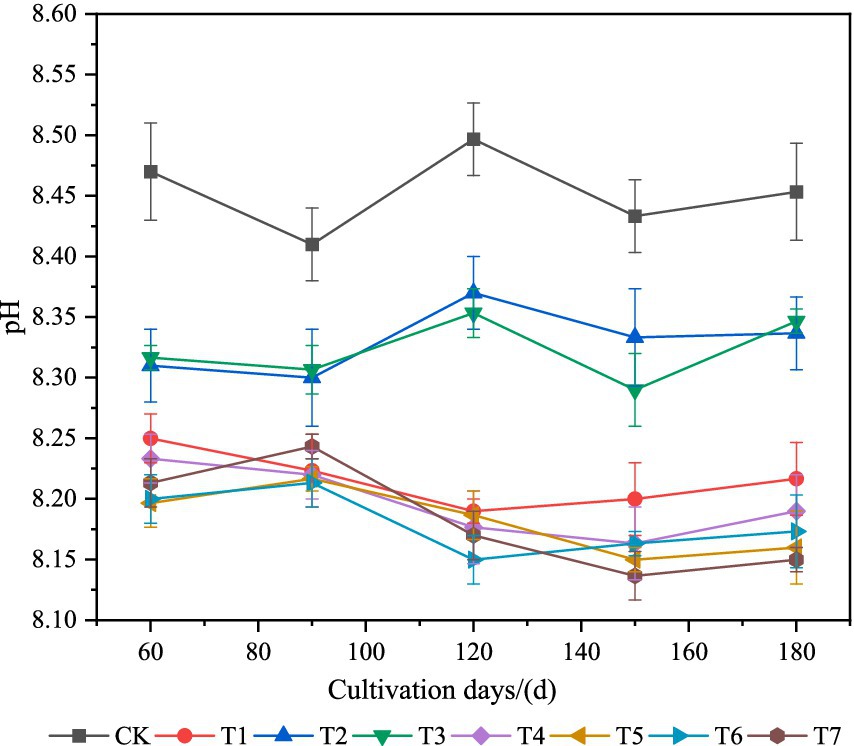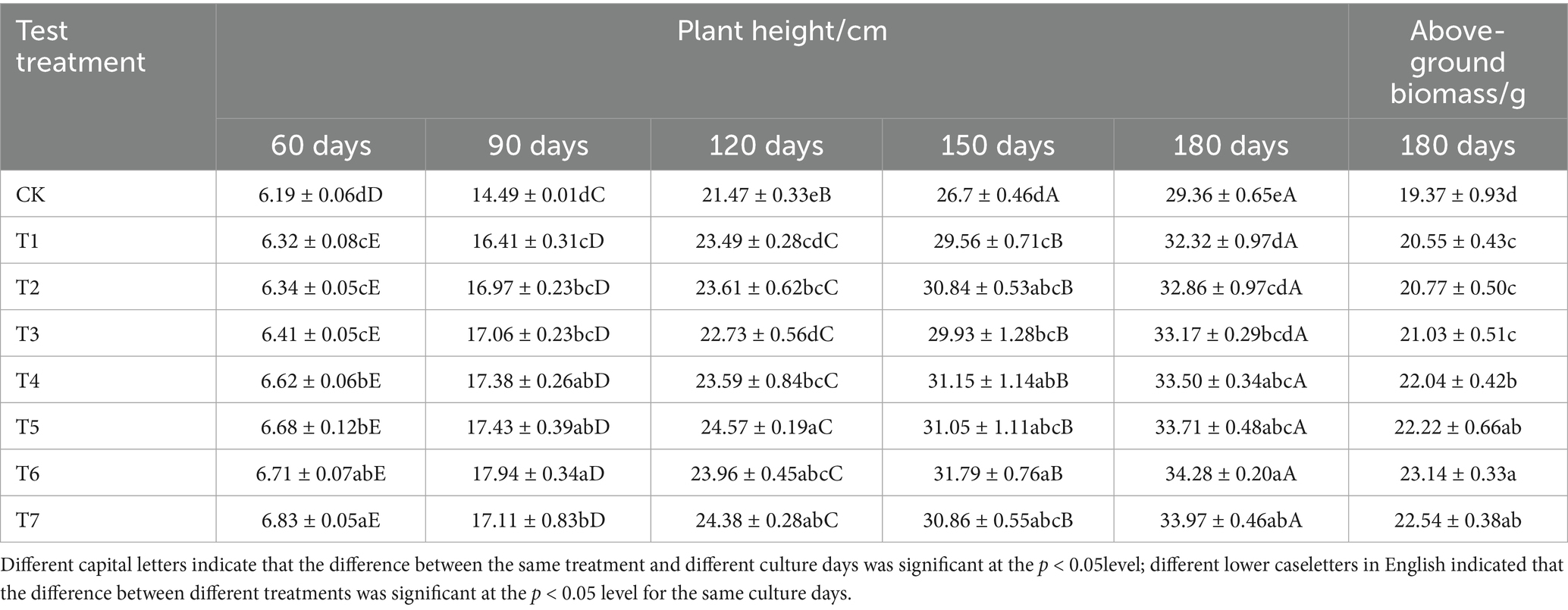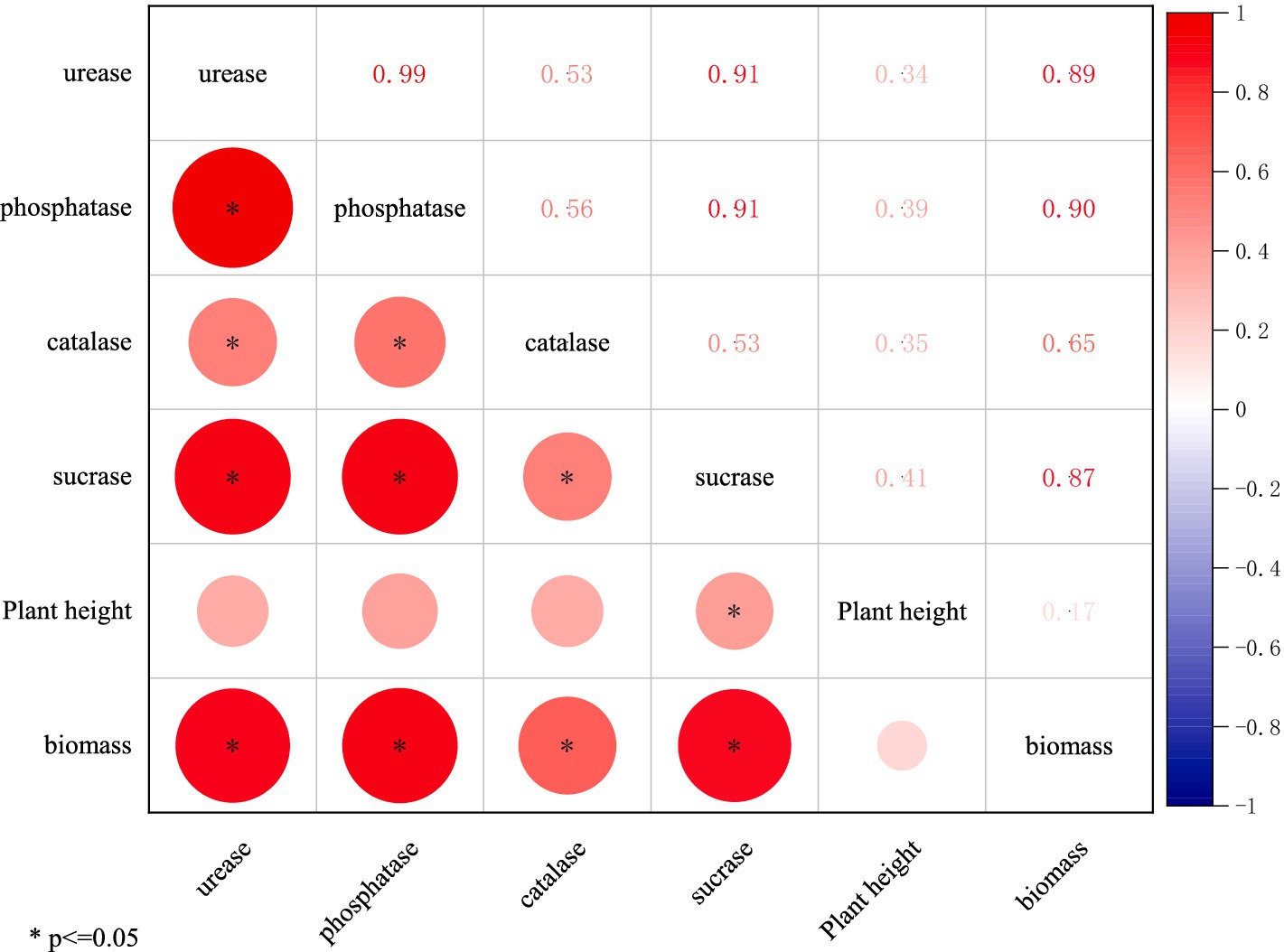- 1Institute of Land Engineering and Technology, Shaanxi Provincial Land Engineering Construction Group Co., Ltd., Xi’an, China
- 2Technology Innovation Center for Land Engineering and Human Settlements, Shaanxi Land Engineering Construction Group Co., Ltd. and Xi’an Jiaotong University, Xi’an, China
- 3Shaanxi Agricultural Development Group Co., Ltd., Xi’an, China
- 4Key Laboratory of Degraded and Unused Land Consolidation Engineering, Ministry of Natural Resources, Xi’an, China
To investigate the effectiveness of combined microbial agents and biochar in improving enzyme activity in sewage-irrigated soil and promoting plant growth, a pot experiment was conducted using sewage-irrigated soil treated with varying ratios of Bacillus subtilis (BS), Trichoderma harzianum (TH), and corn stover biochar (CSB). The study examined changes in soil enzyme activities and the plant height and aboveground biomass of Festuca arundinacea. The results showed that soil sucrase, phosphatase, and urease activities increased with increasing dosages of microbial agents and biochar, reaching their maximum levels under the T6 treatment (BS (0.5 g/kg) + TH (1 g/kg) + CSB (10 g/kg)). Soil catalase activity exhibited an initial increase followed by a decrease with increasing application rates. Heatmap revealed significant positive correlations among the four soil enzyme activities. At 180 days of cultivation, both plant height (34.28 cm) and aboveground biomass (23.14 g) of tall fescue were significantly highest under the T6 treatment (p < 0.05), markedly exceeding those of the control (CK). In conclusion, the co-application of microbial agents and biochar enhances enzyme activity, plant height, and aboveground biomass in sewage-irrigated soil. The T6 ratio represents the optimal combination identified in this study, demonstrating the significant potential of microbial agents and biochar for improving the quality of sewage-irrigated soils.
1 Introduction
The conflict between water supply and demand has been exacerbated by rapid urbanisation, population growth and changing consumption habits (Lyu et al., 2016; dos Santos et al., 2016). The use of treated wastewater for agricultural irrigation is a well-established, reliable source of water available throughout the year in arid and semi-arid regions around the world (Qadir et al., 2007; Li et al., 2012). In Israel, for instance, over 70% of wastewater is treated and used for this purpose (Schacht and Marschner, 2015). China’s freshwater resources are relatively scarce, and water scarcity has become one of the major limiting factors in agricultural production (Chen et al., 2006). According to the second general survey of environmental quality in wastewater irrigated fields, in 1995, about 36,906 ha of land was irrigated with wastewater effluent. Compared to freshwater, wastewater effluents can provide soil with nutrients such as nitrogen and phosphorus, promoting plant growth and reducing the amount of mineral fertiliser required (dos Santos et al., 2016; Toze, 2006). However, inadequate related legislation and lax regulation have caused certain ecological safety problems in agricultural soils, such as soil quality degradation, pathogens and heavy metal enrichment (Pedrero et al., 2010; Qadir et al., 2010). All pollutants in wastewater can enter the soil, plants, and groundwater (Liu et al., 2005; Chen et al., 2013), thereby posing a threat to soil quality, human health, and food safety (Forslund et al., 2012). Therefore, it is essential to improve the quality and microbial activity of irrigation soils contaminated by wastewater by taking measures to inhibit the uptake of toxic and harmful substances by plants.
The inorganic chemical salts, refractory organic compounds, heavy metals, and microbial communities present in wastewater can all impair soil quality and adversely affect crop growth. In particular, microbial communities may significantly alter the native soil microbiota and negatively impact soil enzyme activities. In recent years, biochar has been widely used as an environmentally friendly stabilisation agent for contaminated soil in soil remediation (Luo et al., 2020; Yang et al., 2024). Studies have demonstrated that the high cation exchange capacity, significant water-holding capacity, extensive surface area and metal adsorption properties of biochar can enhance soil physicochemical characteristics and promote plant growth (Wiszniewska et al., 2016; Janus et al., 2015). Additionally, biochar’s larger pore structure can provide a suitable environment for microorganisms, improving their survival rate (Lehmann et al., 2011; Hale et al., 2014; Tao et al., 2018). Microbial fungicides are also widely used in soil improvement as an inexpensive and readily available bacterial fertiliser. Bacillus subtilis has also been shown to be an effective biocontrol agent and plant growth promoter in relatively unstable soils, with broad application prospects (Liu et al., 2011). Bacillus has also been shown to enhance soil microbial activity and alter its composition, particularly when used in conjunction with biochar (Lebrun et al., 2021). Previous studies have demonstrated that biochar promotes bacterial growth and increases the survival of Bacillus subtilis during incubation. Biochar and bacteria that can fix heavy metals are used to reduce the bioavailability of heavy metals in soil and their accumulation in crops (Wang et al., 2017; Pal et al., 2018; Naveed et al., 2020). Wang et al. (2017) used biochar made from corn stover and pig manure to carry Bacillus subtilis for the remediation of soil heavy metal pollution. Using biochar inoculated with Bacillus subtilis to treat contaminated soil significantly increased crop yields and reduced the accumulation of heavy metals in crops (Wang et al., 2017). Therefore, the combined use of biochar and microbial agents as a soil amendment provides a more effective remediation solution.
Currently, most remediation studies on soil quality in dirty irrigation focus on the fixation and passivation of heavy metals, with fewer studies examining enzyme activities in such soils. Soil enzymes are widely distributed and important organic components of soil (Wang et al., 2023). They reflect the power and intensity of various biochemical processes occurring in soil and can be used as important indicators of soil fertility, quality, and microbial activity (Wang et al., 2019; Xiao et al., 2023). Key enzymes such as soil urease and sucrase promote soil nitrogen (N) transformation and carbon cycling (Li et al., 2021). Alkaline phosphatase promotes the hydrolysis of phosphate esters or phosphoric anhydride to mineralise soil organic phosphorus, and its activity level reflects the nutritional status of soil phosphorus (Tian et al., 2016). Catalase promotes the decomposition of hydrogen peroxide in soil and eliminates its toxic effects on crops. Long-term wastewater irrigation can affect soil microorganisms and soil quality. Therefore, it is important to monitor changes in enzyme activities in long-term irrigated soils.
Therefore, this study employed controlled pot experiments to systematically evaluate the regulatory effects of corn stover biochar compound microbial agents (Bacillus subtilis + Trichoderma harzianum) at different mass ratios on wastewater-irrigated soil enzyme activities and growth parameters of Festuca arundinacea. The aim is to provide a theoretical basis for the targeted application of microbe-biochar co-remediation technology in wastewater-irrigated soils.
2 Materials and methods
2.1 Test material
2.1.1 Test soil
The soil used for testing was taken from the former sewage-irrigated farmland in Xichazhai Village in the northern suburbs of Xi’an City in Shaanxi Province. The basic physicochemical properties of the soil are shown in Table 1. Five sampling points were set up in the selected study area, and three sub-sampling points were set up around each one. The surface soil (0–20 cm) from each the sampling point was taken to form a mixture of soil samples. These were selected by the quadratic method in the laboratory, air-dried and sieved (2 mm). The soil container was a 20 cm diameter, 18 cm high flower pot. The experiment was conducted in the greenhouse of the Qinling Field Monitoring Centre Station.
2.1.2 Microbicides
Two powdered microbicides, Bacillus subtilis (BS) and Trichoderma harzianum (TH), were used in this study. Bacillus subtilis is a Gram-positive bacterium and the Bacillus subtilis agent (≥20 billion/g) produced by Weifang Aochi Biotechnology Co. was used in this study. Trichoderma harzianum is a type of fungus and the Trichoderma harzianum microbial agent (≥1 billion/g) produced by Shandong Lulong Biotechnology Co. was used in this study.
2.1.3 Biochar
This study utilized corn stover biochar (CTB) produced by Henan Lize Environmental Technology Co., Ltd.
2.1.4 Test plant
Festuca arundinacea, a common forage grass, was selected for the pot experiment.
2.2 Experimental design
Two microbial agents (Bacillus subtilis and Trichoderma harzianum) were combined with corn stover biochar (CSB). Application rates were set at 0.5 g/kg (low) and 1 g/kg (high) for microbial agents, and 10 g/kg (low) or 20 g/kg (high) for CSB. Eight treatments with three replicates each were established in pot experiments (Table 2). Air-dried soil (≤2 mm particle size) was loaded into pots (6,000 g/pot). Conventional compound fertilizer (25 kg/ha; N:P:K = 1:0.5:1.2), microbial agents, and CSB were applied as basal fertilizers. Soil moisture was adjusted to 60–70% field capacity after homogenization. Festuca arundinacea seeds were sown (10 seeds/pot) in a greenhouse. Seedlings were thinned to three uniform plants per pot at the three-leaf stage. During the 180-day cultivation period: Plant height was measured at 30-day intervals (30, 60, 90, 120, 150, and 180 days); Soil samples were collected concurrently for pH and enzyme activity analysis; Aboveground biomass was harvested at termination (180 days) for fresh weight determination.
2.3 Indicators and analytical methods
2.3.1 Plant measurements
Plant height of Festuca arundinacea was measured using a tape measure at 30, 60, 90, 120, 150, and 180 days after planting (DAP). At 180 DAP, aboveground biomass was harvested and fresh weight determined using an analytical balance (0.01 g precision).
Surface soil samples (0–20 cm depth) were collected from each pot using a soil auger at 30, 60, 90, 120, 150, and 180 days during the cultivation period. Samples were air-dried and sieved (<1 mm). Soil enzyme activities were determined according to Guan (1986): Sucrase: 3,5-Dinitrosalicylic acid colorimetric method, with activity expressed as mg glucose·g−1 soil·24 h−1. Urease: Sodium phenol-hypochlorite colorimetric method, with activity expressed as mg NH₃-N·g−1 soil·24 h−1. Catalase: Potassium permanganate titration, with activity expressed as mL 0.1 mol·L−1 KMnO₄ consumed·g−1 dry soil·h−1. Phosphatase: Disodium phenyl phosphate colorimetric method, with activity expressed as mg phenol·g−1 soil·24 h−1. Soil pH was measured potentiometrically at a soil:water ratio of 1:2.5 (w/v).
2.4 Statistical analysis
Data were processed using Excel 2010, one-way ANOVA was performed using SPSS 22.0 and significance of differences was tested using the LSD method (p < 0.05) and plotted using Origin 2018.
3 Results
3.1 Effect of different treatments on the pH of sewage-irrigated soils
As shown in Figure 1, soil pH under different sewage irrigation treatments exhibited three distinct groups. The highest pH was observed in the CK treatment (mean ≈ 8.45), followed by T2 and T3 treatments, which were lower than CK but higher than T1/T4–T7 (mean ≈ 8.33). The lowest pH occurred in T1, T4, T5, T6, and T7 treatments (mean ≈ 8.18). Soils remained weakly alkaline across all treatments. Compared to CK, pH decreased by 0.12–0.27 in other treatments.
3.2 Effect of different treatments on enzyme activities in sewage-irrigated soils
3.2.1 Sucrase activity
As shown in Figure 2, soil sucrase activity was significantly higher in all treatments compared to CK (p < 0.05). The T6 treatment exhibited the highest activity overall and was significantly greater than other treatments except at 150–180 days (p < 0.05). Biochar dosage significantly increased sucrase activity (T7 > T4 > T1; p < 0.05), with maximum increases of 18.94% (T4 vs. T1 at 120 days), 27.05% (T7 vs. T4 at 180 days), and 42.78% (T7 vs. T1 at 180 days). Similarly, Bacillus subtilis inoculation enhanced activity (T5 > T4 > T3), with T5 being significantly higher than T3 (p < 0.05), though significant improvements required threshold doses; maximum increases reached 9.58% (T4 vs. T3 at 120 days), 21.30% (T5 vs. T3 at 150 days), and 10.70% (T5 vs. T4 at 150 days). For Trichoderma harzianum, T6 showed significantly higher activity than T4 and T2 (T6 > T4 > T2; p < 0.05), demonstrating dose-dependency with maximum increases of 10.96% (T4 vs. T2 at 120 days), 31.14% (T6 vs. T2 at 120 days), and 25.45% (T6 vs. T4 at 60 days).
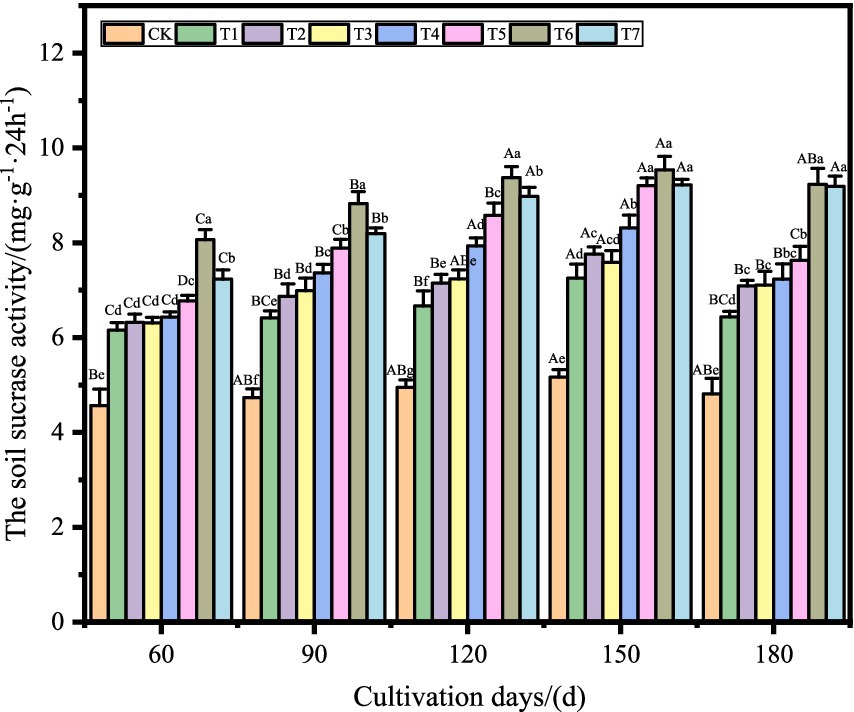
Figure 2. Sucrase activity under experimental treatments. Different capital letters indicate that the difference between the same treatment and different culture days was significant at the p < 0.05 level; different lower caseletters in English indicated that the difference between different treatments was significant at the p < 0.05 level for the same culture days.
3.2.2 Phosphatase activity
As shown in Figure 3, soil phosphatase activity in all treatments significantly exceeded that in CK (p < 0.05), with T6 and T7 being significantly higher than other treatments (p < 0.05). Biochar dosage positively correlated with phosphatase activity (T7 > T4 > T1; p < 0.05), yielding maximum increases of 165.82% (T4 vs. T1 at 150 days), 78.45% (T7 vs. T4 at 60 days), and 225.76% (T7 vs. T1 at 150 days). Bacillus subtilis inoculation increased activity (T5 > T4 > T3), with T5 significantly higher than T3 (p < 0.05), though significant enhancement required threshold levels; maximum increases reached 135.75% (T4 vs. T3 at 150 days), 137.78% (T5 vs. T3 at 150 days), and 37.92% (T5 vs. T4 at 120 days). Similarly, Trichoderma harzianum boosted phosphatase activity (T6 > T4 > T2; p < 0.05), with maximum increases of 147.51% (T4 vs. T2 at 150 days), 240.86% (T6 vs. T2 at 150 days), and 87.57% (T6 vs. T4 at 60 days).
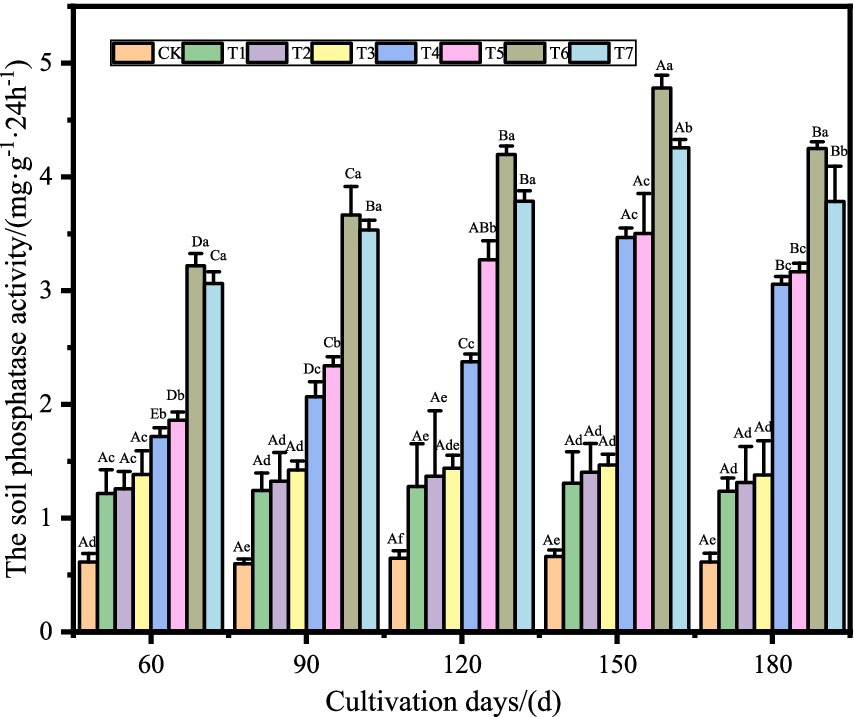
Figure 3. Phosphatase activity under experimental treatments. Different capital letters indicate that the difference between the same treatment and different culture days was significant at the p < 0.05 level; different lower caseletters in English indicated that the difference between different treatments was significant at the p < 0.05 level for the same culture days.
3.2.3 Urease activity
As shown in Figure 4, soil urease activity in all treatments exceeded CK, though only T5, T6, and T7 showed significant differences from CK (p < 0.05). The highest activity occurred in T6. Biochar dosage increased urease activity (T7 > T4 > T1), with T7 significantly higher than T1 (p < 0.05), but significant enhancement required threshold doses; maximum increases reached 36.95% (T4 vs. T1 at 60 days), 29.49% (T7 vs. T4 at 150 days), and 62.03% (T7 vs. T1 at 150 days). Bacillus subtilis inoculation increased activity (T5 > T4 > T3) without significant differences (p > 0.05), with maximum increases of 30.00% (T4 vs. T3 at 60 days), 32.49% (T5 vs. T3 at 60 days), and 20.51% (T5 vs. T4 at 150 days). Similarly, Trichoderma harzianum enhanced urease activity (T6 > T4 > T2), with T6 significantly higher than T2 (p < 0.05) at threshold doses; maximum increases were 34.08% (T4 vs. T2 at 60 days), 60.21% (T6 vs. T2 at 60 days), and 45.25% (T6 vs. T4 at 180 days).
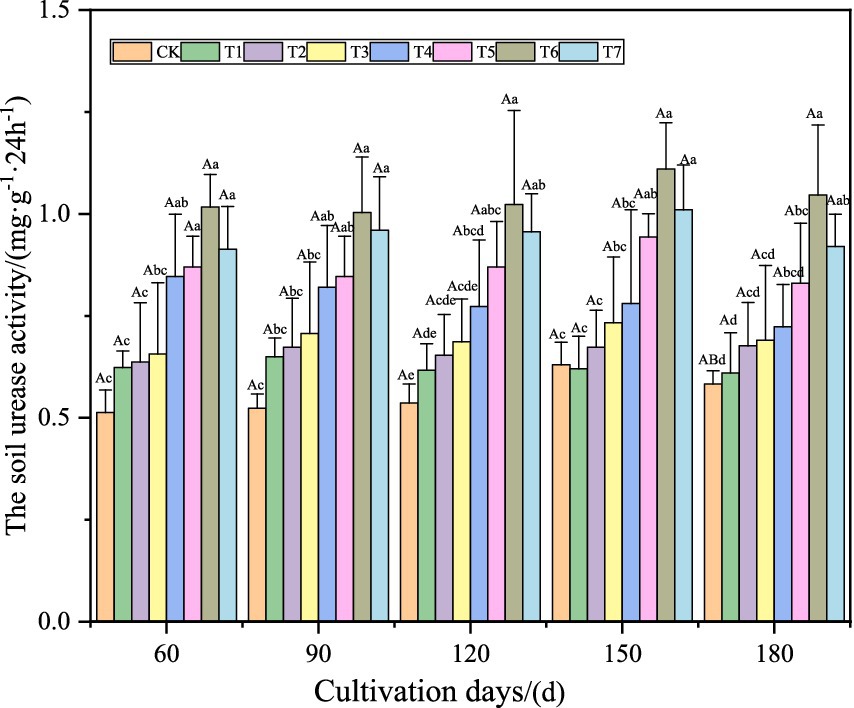
Figure 4. Urease activity under experimental treatments. Different capital letters indicate that the difference between the same treatment and different culture days was significant at the p < 0.05 level; different lower caseletters in English indicated that the difference between different treatments was significant at the p < 0.05 level for the same culture days.
3.2.4 Catalase activity
As can be seen from Figure 5, the soil catalase activity of each treatment was significantly higher than that of CK (p < 0.05), among which the T4 treatment was significantly higher than the other treatments (p < 0.05). T4 > T7 > T1 and all of them were significantly different (p < 0.05), the catalase activity increased firstly and then decreased with the increase of the dosage of biochar, and the maximum increase of T1 to T4 was 170.26% in the 60th day of incubation, the maximum increase of T1 to T7 was 48.38% in the 90th day of incubation and the maximum decrease of T4 to T7 was 48.25% in the 60th day of incubation 170.26%, T1 to T7 maximum increase was 48.38% at 90 days of incubation, and T4 to T7 maximum decrease was 48.25% at 60 days of incubation. T4 > T5 > T3, and all of them were significantly different from 60 to 120 days of incubation (p < 0.05), the catalase activity increased firstly and then decreased with the increase of B. subtilis. T3 to T4 maximum increase was 35.58% at 60 days of incubation and then decreased with the increase of B. subtilis. T3 to T5 was 35.58% at 60 days of incubation, T3 to T5 maximum increase was 9.20% at 180 days of incubation and T4 to T5 maximum decrease was 21.84% at 60 days of incubation. T4 > T6 > T2 and all were significantly different (p < 0.05), i.e., catalase activity increased and then decreased with the increase of Bacillus subtilis. The maximum increase of T2 to T4 at 60 days of incubation was 42.34%, T2 to T6 maximum increase was 23.41% at 180 d of incubation and T4 to T6 maximum increase was 18.09% at 60 days of incubation.
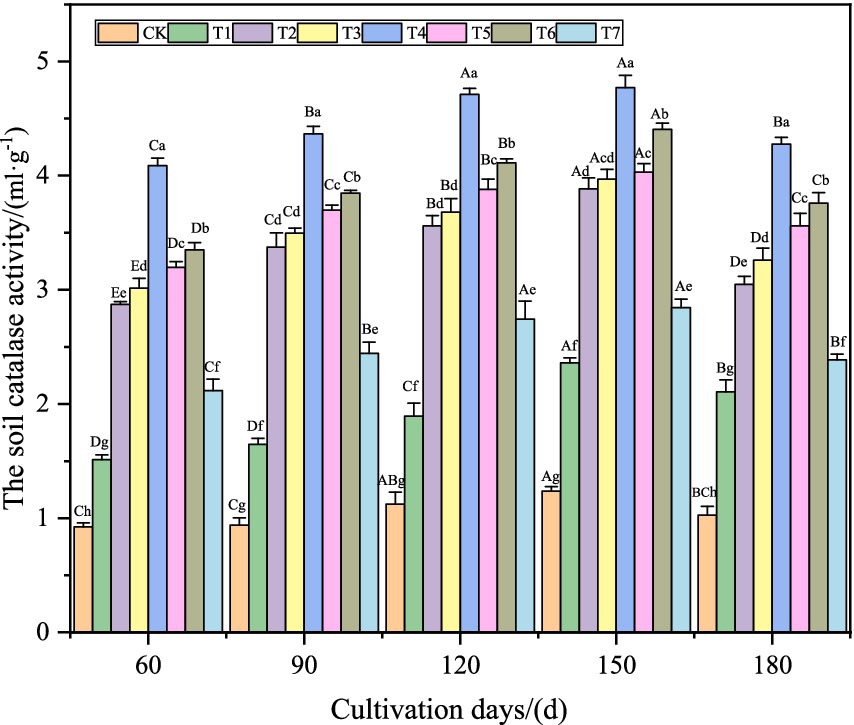
Figure 5. Catalase activity under different treatments. Different capital letters indicate that the difference between the same treatment and different culture days was significant at the p < 0.05 level; different lower caseletters in English indicated that the difference between different treatments was significant at the p < 0.05 level for the same culture days.
As shown in Figure 5, soil catalase activity in all treatments significantly exceeded CK (p < 0.05), with T4 being significantly higher than other treatments (p < 0.05). For biochar treatments (T1, T4, T7), activity initially increased then decreased with dosage (T4 > T7 > T1; p < 0.05), showing maximum increases of 170.26% (T4 vs. T1 at 60 days) and 48.38% (T7 vs. T1 at 90 days), but a maximum decrease of 48.25% (T7 vs. T4 at 60 days). With Bacillus subtilis (T3, T4, T5), catalase activity also peaked then declined (T4 > T5 > T3; significant at 60–120 days, p < 0.05), with maximum increases of 35.58% (T4 vs. T3 at 60 days) and 9.20% (T5 vs. T3 at 180 days), but a maximum decrease of 21.84% (T5 vs. T4 at 60 days). For Trichoderma harzianum (T2, T4, T6), activity increased then decreased (T4 > T6 > T2; p < 0.05), yielding maximum increases of 42.34% (T4 vs. T2 at 60 days), 23.41% (T6 vs. T2 at 180 days), and 18.09% (T6 vs. T4 at 60 days).
3.3 Effects of experimental treatments on Festuca arundinacea plant height and biomass
Table 3 presents plant height and aboveground biomass of Festuca arundinacea across treatments at different growth stages. All treatments exceeded CK in both parameters. At 60 days, T6 and T7 showed significantly greater height than other treatments. By 90 days, T6 achieved maximum height, significantly surpassing CK, T1–T3, and T7. At 120 days, T5-T7 exhibited higher heights than other treatments. From 150–180 days, T6 maintained the highest height, significantly exceeding CK and T1-T3. T6 also yielded greater aboveground biomass than CK and T1–T4. Excluding CK, plant height increased significantly with longer cultivation periods. The aboveground biomass of Festuca arundinacea was greatest under the T6 treatment, and significantly greater than that under the CK, T1, T2, T3, and T4 treatments (p < 0.05).
3.4 Correlations between soil enzyme activities, plant height and aboveground biomass
Correlation heatmap analysis (Figure 6) revealed significant positive correlations among soil sucrase, phosphatase, urease, catalase, and the aboveground biomass of Festuca arundinacea. Plant height showed a significant correlation only with urease.
4 Discussion
4.1 Effect of biochar synergized with microbial agents on pH in sewage-irrigated soil
In this study, soil pH under all treatments was lower than in the control (CK), indicating that biochar and microbial agents reduced soil pH under sewage irrigation. Treatments T4, T5, T6, and T7 exhibited significantly lower pH than T1, T2, and T3, suggesting that increased dosages of Trichoderma harzianum, Bacillus subtilis, and biochar further decreased pH. This reduction may be attributed to biochar’s high porosity and water-holding capacity (Hale et al., 2015), which promote microbial activity and metabolism of humic acids. Additionally, biochar application increased soil organic matter (SOM) content, a key indicator of soil fertility (Prayogo et al., 2014). The decomposition of SOM produces organic acids and CO2, explaining the observed pH decrease induced by biochar and microbial agents in sewage-irrigated soils.
4.2 Effect of biochar synergized with microbial agents on enzyme activities in sewage-irrigated soil
Soil enzyme activities serve as indicators for assessing agricultural practice effects on soil properties, including fertiliser application (Yang et al., 2008; Li et al., 2010) and irrigation (Zhang and Wang, 2006). Phosphatase, urease, and invertase activities respond rapidly to soil management changes and nutrient cycling dynamics, providing valuable metrics for evaluating treated effluent impacts on soil biogeochemical processes and fertility (Chen et al., 2008). In this study, sucrase, phosphatase, urease, and catalase activities increased with elevated microbial agent and biochar application rates across treatments, consistent with established findings (Saxena et al., 2013; Mishra et al., 2017) that both microbial agents and biochar enhance enzymatic activity. This enhancement occurs because microbial agents introduce substantial nutrients and organic matter, improving soil nutrient status and organic content. Under adequate nitrogen and carbon availability, these amendments stimulate highly active microorganisms that improve the soil microenvironment and activate indigenous microbiota. During reproduction and metabolism, microorganisms accelerate organic compound decomposition, providing enzyme reaction substrates that directly increase invertase and catalase activities (Sahin et al., 2011). Corn stover biochar contributes organic carbon, mineral elements, and extensive surface area, directly supplying microbial nutrients and energy while optimizing soil C:N ratios to promote crop and microbial growth, thereby elevating enzyme activities. However, catalase activity decreased when microbial agents and biochar exceeded optimal application rates, indicating that excessive amendments inhibit this enzyme. This suppression likely stems from nutrient ratio imbalances inducing ion antagonism, ultimately reducing catalase activity.
4.3 Effect of biochar synergized with microbial agents on Festuca arundinacea growth in sewage-irrigated soil
With the increase of corn stover biochar and microbial agents, Festuca arundinacea plant height and aboveground biomass were highest under the T6 treatment for the following reasons: firstly, the increased soil enzyme activity mentioned above indicates that biochar in combination with microbial agents enhances plant utilisation of fertilisers (Liang et al., 2003), thus promoting Festuca arundinacea growth; secondly, the addition of biochar and microbial agents boosts soil enzyme activity, further stimulating plant growth; thirdly, Bacillus subtilis and Trichoderma harzianum likely produce various phytohormones-such as indole acetic acid, abscisic acid, organic acids, gibberellins, and cytokinins-which induce Festuca arundinacea growth (Tu et al., 2016).
While this study demonstrates the agronomic efficacy of combined Bacillus subtilis (0.5 g/kg), Trichoderma harzianum (1 g/kg), and corn stover biochar (10 g/kg) (T6 treatment) in enhancing soil enzyme activities and Festuca arundinacea growth in sewage-irrigated soils, a brief consideration of the Life Cycle Assessment (LCA) framework is warranted to contextualize its environmental sustainability. The production and application of these amendments incur environmental burdens that must be weighed against their benefits. For corn stover biochar (CSB), key LCA inputs include the energy consumption and emissions during pyrolysis (dependent on technology and scale), feedstock transportation, and potential land-use impacts from stover removal (Patel et al., 2025; Karolina et al., 2024). Microbial agent production involves resource inputs for fermentation, formulation, and stabilization. However, significant environmental credits may offset these burdens. CSB offers long-term carbon sequestration potential, locking atmospheric CO₂ into a stable form for centuries, directly contributing to climate change mitigation. Utilizing agricultural waste (corn stover) for CSB production avoids open burning emissions and promotes circular resource use (Waheed et al., 2025). The enhanced soil fertility and structure observed (via improved enzyme activity and plant growth) can reduce dependence on synthetic fertilizers in the long term, lowering associated manufacturing emissions and nutrient runoff. Improved plant biomass production further enhances carbon sequestration. Within the specific context of rehabilitating degraded sewage-irrigated soils, the T6 treatment’s demonstrated effectiveness in restoring soil biological function and productivity represents a crucial ecosystem service recovery. A comprehensive LCA would quantify net impacts across categories like global warming potential, eutrophication, and resource depletion, but based on established mechanisms, the integration of waste-derived biochar and beneficial microbes presents a strong case for net environmental benefit, particularly through carbon sequestration and reduced fertilizer dependency, enhancing the overall sustainability profile of this remediation strategy for marginal soils. Future work should include a full LCA to validate these potential net gains.
5 Conclusion
We conclude that due to synergistic effects, the addition of biochar and microbial agents increased enzyme activity, Festuca arundinacea plant height, and aboveground biomass more than either application alone. This combination provided a more suitable cultivation environment, improved soil conditions, and promoted plant growth; it can therefore be considered a safe formulation for rehabilitating contaminated irrigation soils. The main conclusions are as follows: (1) sucrase activity, phosphatase activity, and urease activity in contaminated irrigation soil increased with biochar and microbial agent application, while catalase activity showed an initial increase followed by a decrease; (2) the highest sucrase, phosphatase, and urease activities occurred under T6 treatment, whereas catalase activity peaked under T4 treatment, with Tall Fescue plant height and aboveground biomass also highest under T6 treatment. Since the pot experiment occurred in a relatively stable microenvironment, its limited scale differs from actual field conditions, necessitating further research on biochar-microbial applications in more complex field soil environments.
Data availability statement
The raw data supporting the conclusions of this article will be made available by the authors, without undue reservation.
Author contributions
PS: Supervision, Writing – review & editing, Writing – original draft, Methodology, Formal analysis. ZL: Writing – review & editing, Writing – original draft, Formal analysis. SY: Writing – review & editing, Writing – original draft.
Funding
The author(s) declare that financial support was received for the research and/or publication of this article. This research was funded by Shaanxi Provincial Land Engineering Construction Group fund (DJTD-2024-01) and the Technology Innovation Center for Land Engineering and Human Settlements, Shaanxi Land Engineering Construction Group Co., Ltd and Xi’an Jiaotong University (2024WHZ0232).
Conflict of interest
PS, ZL, and YS were all employed by Shaanxi Provincial Land Engineering Construction Group Co., Ltd., Shaanxi Land Engineering Construction Group Co., Ltd., and Shaanxi Agricultural Development Group Co., Ltd.
Generative AI statement
The authors declare that no Gen AI was used in the creation of this manuscript.
Publisher’s note
All claims expressed in this article are solely those of the authors and do not necessarily represent those of their affiliated organizations, or those of the publisher, the editors and the reviewers. Any product that may be evaluated in this article, or claim that may be made by its manufacturer, is not guaranteed or endorsed by the publisher.
Reference
Chen, W., Lu, S., Jiao, W., Wang, M., and Chang, A. C. (2013). Reclaimed water: a safe irrigation water source? Environ. Dev. 8, 74–83. doi: 10.1016/j.envdev.2013.04.003
Chen, J. Y., Tang, C. Y., and Yu, J. J. (2006). Use of 18O, 2H, and 15N to identify nitrate contamination of groundwater in a wastewater irrigated field near the city of Shijiazhuang China. J. Hydrol. 326, 367–378. doi: 10.1016/j.jhydrol.2005.11.007
Chen, W., Wu, L., Frankenberger, W. T., and Chang, A. C. (2008). Soil enzyme activities of long-term reclaimed wastewater-irrigated soils. J. Environ. Qual. 37, S36–S42. doi: 10.2134/jeq2007.0315
dos Santos, L. N., Matsura, E. E., Goncalves, I. Z., Barbosa, E. A., Nazário, A. A., Tuta, N. F., et al. (2016). Water storage in the soil profile under subsurface drip irrigation: evaluating two installation depths of emitters and two water qualities. Agric. Water Manag. 170, 91–98. doi: 10.1016/j.agwat.2015.09.025
Forslund, A., Ensink, J. H., Markussen, B., Battilani, A., Psarras, G., Gola, S., et al. (2012). Escherichia coli contamination and health aspects of soil and tomatoes (Solanum lycopersicum L.) subsurface drip irrigated with on-site treated domestic wastewater. Water Res. 46, 5917–5934. doi: 10.1016/j.watres.2012.08.011
Hale, L., Luth, M., and Crowley, D. (2015). Biochar characteristics relate to its utility as an alternative soil inoculum carrier to peat and vermiculite. Soil Biol. Biochem. 81, 228–235. doi: 10.1016/j.soilbio.2014.11.023
Hale, L., Luth, M., Kenney, R., and Crowley, D. (2014). Evaluation of pinewood biochar as a carrier of bacterial strain Enterobacter cloacae, UW5 for soil inoculation. Appl. Soil Ecol. 84, 192–199. doi: 10.1016/j.apsoil.2014.08.001
Janus, A., Pelfrêne, A., Heymans, S., Deboffe, C., Douay, F., and Waterlot, C. (2015). Elaboration, characteristics and advantages of biochars for the management of contaminated soils with a specific overview on Miscanthus biochars. J. Environ. Manag. 162, 275–289. doi: 10.1016/j.jenvman.2015.07.056
Karolina, K., Joanna, S., Joanna, S., Bestani, B., Banasri, R., and Beata, M. (2024). Carbon dioxide adsorption over activated biocarbons derived from lemon Peel. Cules 29:4183. doi: 10.3390/molecules29174183
Kouznetsov, M., Pachepsky, Y., Gillerman, C., Gantzer, C., and Oron, G. (2004). Microbial transport in soil caused by surface and subsurface drip irrigation with treated wastewater. Int. Agrophys. 18, 239–248.
Lebrun, M., Miard, F., Bucci, A., Trupiano, D., Nandillon, R., Naclerio, G., et al. (2021). Evaluation of direct and biochar carrier-based inoculation of Bacillus sp. on as- and Pb-contaminated technosol: effect on metal(loid) availability, Salix viminalis growth, and soil microbial diversity/activity. Environ. Sci. Pollut. Res. 28, 11195–11204. doi: 10.1007/s11356-020-11355-1
Lehmann, J., Rillig, M. C., Thies, J., Masiello, C. A., Hockaday, W. C., and Crowley, D. (2011). Biochar effects on soil biota—a review. Soil Biol. Biochem. 43, 1812–1836. doi: 10.1016/j.soilbio.2011.04.022
Li, J., Li, Y., and Zhang, H. (2012). Tomato yield and quality and emitter clogging as affected by chlorination schemes of drip irrigation systems applying sewage effluent. J. Integr. Agric. 11, 1744–1754. doi: 10.1016/S2095-3119(12)60179-8
Li, J., Yang, W., Guo, A., Yang, S., Chen, J., Qiao, Y., et al. (2021). Combined foliar and soil selenium fertilizer improves selenium transport and the diversity of rhizosphere bacterial community in oats. Environ. Sci. Pollut. Res. 28, 64407–64418. doi: 10.1007/s11356-021-15439-4
Li, F., Yu, J., Nong, M., Kang, S., and Zhang, J. (2010). Partial root-zone irrigation enhanced soil enzyme activities and water use of maize under different ratios of inorganic to organic nitrogen fertilizers. Agric. Water Manag. 97, 231–239. doi: 10.1016/j.agwat.2009.09.014
Liang, Y. C., Yang, Y. F., Yang, C. G., Shen, Q. R., Zhou, J. M., and Yang, L. Z. (2003). Soil enzymatic activity and growth of rice and barley as influenced by organic manure in an anthropogenic soil. Geoderma 115, 149–160. doi: 10.1016/S0016-7061(03)00084-3
Liu, Y., Tao, J., Yan, Y. J., Li, B., Li, H., and Li, C. (2011). Biocontrol efficiency of Bacillus subtilis SL-13 and characterization of an antifungal chitinase. Chin. J. Chem. Eng. 19, 128–134. doi: 10.1016/S1004-9541(09)60188-9
Liu, W., Zhao, J., Ouyang, Z., Söderlund, L., and Liu, G. (2005). Impacts of sewage irrigation on heavy metal distribution and contamination in Beijing, China. Environ. Int. 31, 805–812. doi: 10.1016/j.envint.2005.05.042
Luo, Z., Kayiranga, A., Uwiringiyimana, E., Zhang, Q., Yan, C., Guo, J., et al. (2020). Thallium contamination in agricultural soils and associated potential remediation via biochar utilization. Biochar 2:14, 33–46. doi: 10.1007/s42773-020-00042-6
Lyu, S., Chen, W., Zhang, W., Fan, Y., and Jiao, W. (2016). Wastewater reclamation and reuse in China: opportunities and challenges. J. Environ. Sci. 39, 86–96. doi: 10.1016/j.jes.2015.11.012
Mishra, J., Singh, R., and Arora, N. K. (2017). Alleviation of heavy metal stress in plants and remediation of soil by rhizosphere microorganisms. Front. Microbiol. 8:1706. doi: 10.3389/fmicb.2017.01706
Naveed, M., Mustafa, A., Qura-Tul-Ain Azhar, S., Kamran, M., Zahir, Z. A., and Nú~ nezDelgado, A. (2020). Burkholderia phytofirmans PsJN and tree twigs derived biochar together retrieved Pb-induced growth, physiological and biochemical disturbances by minimizing its uptake and translocation in mung bean (Vigna radiata L.). J. Environ. Manag. 257:109974. doi: 10.1016/j.jenvman.2019.109974
Pal, A. K., Chakraborty, A., and Sengupta, C. (2018). Differential effects of plant growth promoting rhizobacteria on chilli (Capsicum annuum L.) seedling under cadmium and lead stress. Plant Sci. Today 5, 182–190. doi: 10.14719/pst.2018.5.4.419
Patel, K., Vashist, M., Goyal, D., Sarma, R., Garg, R., and Singh, S. (2025). From waste to resource: a life cycle assessment of biochar from agricultural residue. Environ. Prog. Sustain. Energy 44:14558. doi: 10.1002/ep.14558
Pedrero, F., Kalavrouziotis, I., Alarcón, J. J., Koukoulakis, P., and Asano, T. (2010). Use of treated municipal wastewater in irrigated agriculture-review of some practices in Spain and Greece. Agric. Water Manag. 97, 1233–1241. doi: 10.1016/j.agwat.2010.03.003
Prayogo, C., Jones, J. E., Baeyens, J., and Bending, G. D. (2014). Impact of biochar on mineralisation of C and N from soil and willow litter and its relationship with microbial community biomass and structure. Biol. Fertil. Soils 50, 695–702. doi: 10.1007/s00374-013-0884-5
Qadir, M., Sharma, B. R., Bruggeman, A., Choukr-Allah, R., and Karajeh, F. (2007). Non-conventional water resources and opportunities for water augmentation to achieve food security in water scarce countries. Agric. Water Manag. 87, 2–22. doi: 10.1016/j.agwat.2006.03.018
Qadir, M., Wichelns, D., Raschid-Sally, L., McCornick, P. G., Drechsel, P., Bahri, A., et al. (2010). The challenges of wastewater irrigation in developing countries. Agric. Water Manag. 97, 561–568. doi: 10.1016/j.agwat.2008.11.004
Sahin, U., Eroglu, S., and Sahin, F. (2011). Microbial application with gypsum increases the saturated hydraulic conductivity of saline-sodic soils. Appl. Soil Ecol. 48, 247–250. doi: 10.1016/j.apsoil.2011.04.001
Saxena, J., Rana, G., and Pandey, M. (2013). Impact of addition of biochar along with Bacillus sp. on growth and yield of French beans. Sci. Hortic. 162, 351–356. doi: 10.1016/j.scienta.2013.08.002
Schacht, J., and Marschner, B. (2015). Treated wastewater irrigation effects on soil hydraulic conductivity and aggregate stability of loamy soils in Israel. J. Hydrol. Hydromech. 63, 47–54. doi: 10.1515/johh-2015-0010
Tao, S. Y., Wu, Z. S., He, X. W., Ye, B. C., and Li, C. (2018). Characterization of biochar prepared from cotton stalks as efficient inoculum carriers for bacillus subtilis SL-13. Bioresources 13, 1773–1786. doi: 10.15376/biores.13.1.1773-1786
Tian, J., Wei, K., Condron, L. M., Chen, Z., Xu, Z., and Chen, L. (2016). Impact of land use and nutrient addition on phosphatase activities and their relationships with organic phosphorus turnover in semi-arid grassland soils. Biol. Fertil. Soils 52, 675–683. doi: 10.1007/s00374-016-1110-z
Toze, S. (2006). Reuse of effluent water-benefits and risks. Agric. Water Manag. 80, 147–159. doi: 10.1016/j.agwat.2005.07.010
Tu, L., He, Y. H., Shan, C. H., and Wu, Z. S. (2016). Preparation of microencapsulated Bacillus subtilis SL-13 seed coating agents and their effects on the growth of cotton seedlings. Biomed. Res. Int. 2016:3251357. doi: 10.1155/2016/3251357
Waheed, A., Xu, H., Qiao, X., Aili, A., Yiremaikebayi, Y., Haitao, D., et al. (2025). Biochar in sustainable agriculture and climate mitigation: mechanisms, challenges, and applications in the circular bioeconomy. Biomass Bioenergy 193:107531. doi: 10.1016/j.biombioe.2024.107531
Wang, X., Fan, J., Xing, Y., Xu, G., Wang, H., Deng, J., et al. (2019). Chapter three -the effects of mulch and nitrogen fertilizer on the soil environment of crop plants. Agronomy 153, 121–173. doi: 10.1016/bs.agron.2018.08.003
Wang, X. H., Nie, Z. W., He, L. Y., Wang, Q., and Sheng, X. F. (2017). Isolation of as-tolerant and their potentials of reducing as and cd accumulation of edible tissues of vegetables in metal(loid)-contaminated soils. Sci. Total Environ. 579, 179–189. doi: 10.1016/j.scitotenv.2016.10.239
Wang, X., Xiao, Y., Luo, X., Ye, C., Chen, Y., Xiang, J., et al. (2023). Short-term effects of tunnel construction on soil organic carbon and enzyme activity in shrublands in eastern Tibet plateau. Sustainability 15:5107. doi: 10.3390/su15065107
Wiszniewska, A., Hanus-Fajerska, E., Muszynska, E., and Ciarkowska, K. (2016). Natural organic amendments for improved phytoremediation of polluted soils: a review of recent progress. Pedosphere 26, 1–12. doi: 10.1016/S1002-0160(15)60017-0
Xiao, L., Min, X., Liu, G., Li, P., and Xue, S. (2023). Effect of plant–plant interactions and drought stress on the response of soil nutrient contents, enzyme activities and microbial metabolic limitations. Appl. Soil Ecol. 181:104666. doi: 10.1016/j.apsoil.2022.104666
Yang, L., Li, T., Li, F., Lemcoff, J. H., and Cohen, S. (2008). Fertilization regulates soil enzymatic activity and fertility dynamics in a cucumber field. Sci. Hortic. 116, 21–26. doi: 10.1016/j.scienta.2007.11.001
Yang, Y., Wang, X., Wang, Y., Saleem, M., Mu, Y., Zheng, Y., et al. (2024). Pesticide contamination remediation by biochar-immobilized microorganisms: a review. Int. J. Environ. Sci. Technol. 21:21, 2225–2238. doi: 10.1007/s13762-023-05204-0
Keywords: sewage irrigated soil, Bacillus subtilis , Trichoderma harzianum , corn stover biochar, soil enzyme activity
Citation: Sun P, Liu Z and Yingying S (2025) Effect of biochar with microbial agents on enzyme activity in sewage irrigated soil. Front. Sustain. Food Syst. 9:1615939. doi: 10.3389/fsufs.2025.1615939
Edited by:
Lakhan Kumar, Maulana Azad National Institute of Technology, IndiaReviewed by:
Banasri Rou, Birla Institute of Technology and Science, IndiaKulvendra Patel, Delhi Technological University, India
Copyright © 2025 Sun, Liu and Yingying. This is an open-access article distributed under the terms of the Creative Commons Attribution License (CC BY). The use, distribution or reproduction in other forums is permitted, provided the original author(s) and the copyright owner(s) are credited and that the original publication in this journal is cited, in accordance with accepted academic practice. No use, distribution or reproduction is permitted which does not comply with these terms.
*Correspondence: Pei Sun, NTU0ODU5MDM1QHFxLmNvbQ==
 Pei Sun
Pei Sun Zhe Liu1,2,3,4
Zhe Liu1,2,3,4
